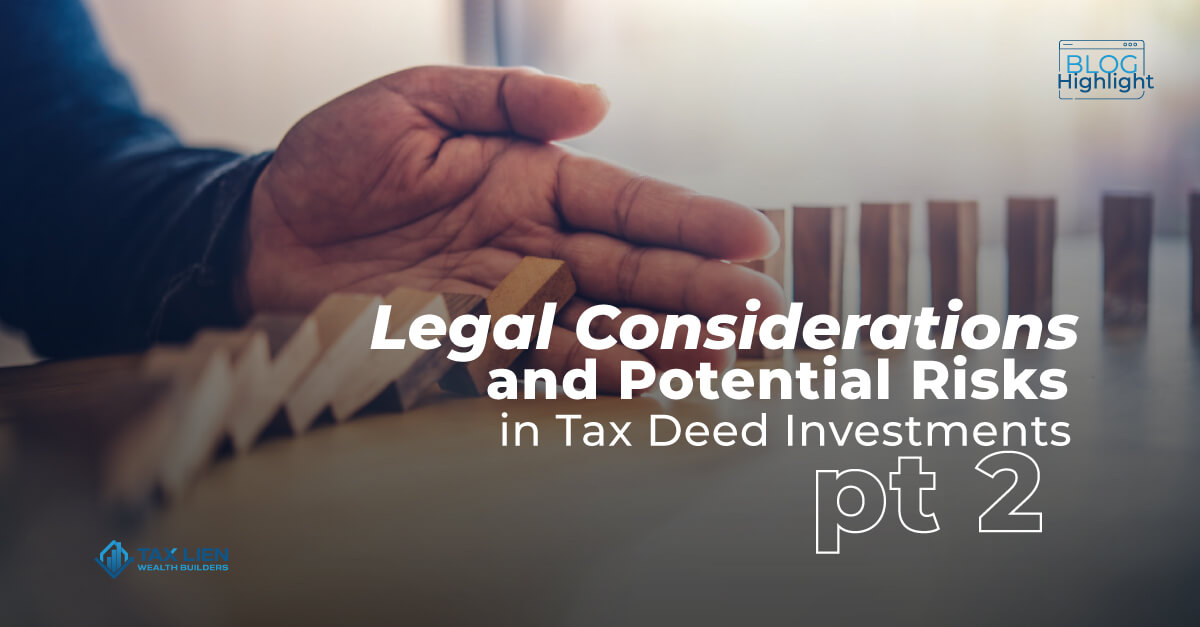Legal Considerations and Potential Risks in Tax Deed Investing Pt. 2
In Part 1 of our guide we discussed the basic legal considerations and potential risks involved in tax deed investments.
Now we will explore specific areas such as dealing with occupants or tenants, insurance considerations, tax implications, and the importance of consulting with a real estate attorney.
Understanding these aspects will help you navigate the complexities of tax deed investing more effectively.
Other Factors to Consider in Tax Deed Investing
Identifying Occupants: Once you acquire a property through a tax deed auction it’s crucial to determine if the property is occupied
Inspection: Conduct a property inspection to check for any signs of occupancy
Public records: Review public records to identify any registered tenants or lease agreements associated with the property
Legal eviction process: If the property is occupied you may need to initiate the eviction process which must be done legally and respectfully
Serve notice: Provide the occupants with a formal eviction notice according to state and local laws
Court proceedings: If occupants do not vacate voluntarily you may need to file for an eviction hearing in court
Law enforcement: In some cases law enforcement may be required to enforce the eviction order
Negotiating with tenants: In certain situations negotiating with tenants can be beneficial
Cash for keys: Offer a financial incentive for occupants to vacate the property voluntarily
New lease agreement: If the tenants are reliable consider negotiating a new lease agreement to keep them as renters
Insurance considerations
Property insurance: Securing adequate insurance for your tax deed property is essential to protect your investment
Coverage types: Obtain comprehensive property insurance that covers risks such as fire, theft, and natural disasters
Liability insurance: Consider liability insurance to protect against potential lawsuits from injuries or damages occurring on the property
Title insurance: Title insurance is critical to safeguard against potential title disputes
Policy purchase: Purchase a title insurance policy to protect your ownership rights against any unforeseen claims or defects in the property’s title
Legal protection: Title insurance provides legal defense and financial coverage if a title issue arises
Tax Implications in Tax Deed Investments.
Understanding tax obligations: Tax deed investments have specific tax implications that investors must understand
Capital gains tax: Profits from the sale of a tax deed property are subject to capital gains tax. The rate depends on the holding period and your overall tax situation
Property Taxes: As the new owner you are responsible for ongoing property taxes. Ensure timely payment to avoid future tax liens
Depreciation: Rental properties can be depreciated over time providing potential tax benefits
Tax deductions: Maximize your tax benefits by taking advantage of applicable deductions
Expenses: Deduct expenses related to property management, repairs, and improvements
When to Consult with a Real Estate Attorney.
Complex transactions: Engage a real estate attorney for complex transactions to ensure legal compliance and protect your interests
Title issues: If there are potential title disputes or encumbrances a real estate attorney can provide expert guidance and resolution strategies
Eviction proceedings: Legal assistance is beneficial during eviction processes to ensure all actions comply with state and local laws
Risk mitigation: Consulting with a real estate attorney can help mitigate risks and avoid costly mistakes
Contract review: Have your attorney review contracts, purchase agreements, and any other legal documents associated with the transaction
Legal advice: Seek advice on zoning laws, property regulations, and other legal considerations that may impact your investment
Navigating the legal considerations and potential risks of tax deed investments requires careful planning and expert guidance.
By understanding how to deal with occupants or tenants, securing proper insurance, recognizing tax implications, and knowing when to consult with a real estate attorney, you can protect your investment and achieve successful outcomes.
Stay informed, stay prepared, and make informed decisions to maximize your returns in the tax deed investment market.







